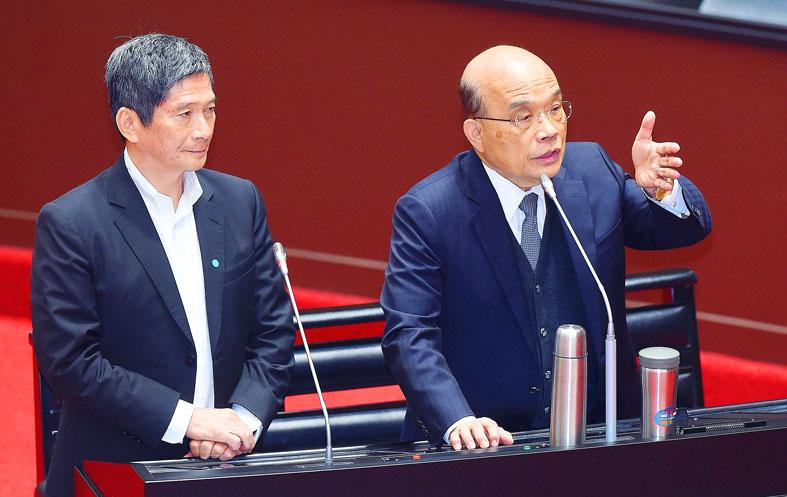Premier Su Tseng-chang (蘇貞昌) yesterday urged the public to stand up against China’s human rights contraventions, after some Taiwanese celebrities joined Beijing’s boycott of clothing brands that expressed concern over allegations of forced labor on cotton plantations in China’s Xinjiang region.
China’s state-owned media have called on the Chinese public to boycott foreign firms including Hennes & Mauritz AB (H&M) and Nike Inc following sanctions by Western governments over the mass internment of Muslim Uighurs.
In response, several Taiwanese entertainers have withdrawn their endorsements from the brands targeted by Beijing.

Photo: Liao Chen-huei, Taipei Times
During a plenary session at the legislature yesterday, Democratic Progressive Party Legislator Rosalia Wu (吳思瑤) asked Cabinet officials to comment on the celebrities.
She said Ouyang Nana (歐陽娜娜), Janine Chang (張鈞甯) and Greg Hsu (許光漢) were among those who joined the Beijing-directed boycott of “all speech and action that slandered China.”
In response, Su said that “some people have no sense of propriety. Their actions were selfish and showed a lack of understanding for the importance of human rights.”
Although the entertainers’ behavior was against Taiwan’s “national interest and disrespectful of human rights,” Taiwan is a country based on rights, and the government would not take action against offensive, but otherwise legal speech, he said.
“I call on the public to speak on behalf of human rights, and to work toward advancing human rights in the world,” Su said.
Chinese Nationalist Party (KMT) Legislator Lee De-wei (李德維) asked Su if the government has plans to sanction imports of cotton from Xinjiang.
Su said that while Executive Yuan agencies have not proposed any plans yet, “I have fought for human rights all my life and my belief is that we should boycott anything and anyone who contravenes human rights.”
Taiwan’s transformation into a democracy took years and was due to the effort of multiple generations of Taiwanese, and the nation must condemn oppression wherever it occurs, he said.
If Taiwan imposes sanctions, the government would select policies that achieve the best results for the country, Su said, adding that Taiwan should not be left behind when other human rights-respecting democracies are boycotting Beijing for its abuses.
“Human rights are universal values and an expression of civilization,” Minister of Culture Lee Yung-te (李永得) said.
China’s human rights abuses are severe, and Taiwan should stand with the world in condemning and sanctioning it, he said.
Lee called on the entertainers to look at the world from the perspective of values and not commercial profit, which have led them to give endorsements to a government that disrespects human rights.
Concerning sanctions, Wu said she believes that the government should take a more active role and not just ask the public to boycott cotton from Xinjiang.
The Executive Yuan could exclude cotton from the region and other products associated with human rights abuses from government procurement, and ask socially responsible businesses to boycott products made by forced labor, she said.
“This is an opportunity for Taiwan’s textile industry to enter the global market. Should major countries propose a total ban [on cotton from Xinjiang], we should consider joining it,” she said.

SECURITY: As China is ‘reshaping’ Hong Kong’s population, Taiwan must raise the eligibility threshold for applications from Hong Kongers, Chiu Chui-cheng said When Hong Kong and Macau citizens apply for residency in Taiwan, it would be under a new category that includes a “national security observation period,” Mainland Affairs Council (MAC) Minister Chiu Chui-cheng (邱垂正) said yesterday. President William Lai (賴清德) on March 13 announced 17 strategies to counter China’s aggression toward Taiwan, including incorporating national security considerations into the review process for residency applications from Hong Kong and Macau citizens. The situation in Hong Kong is constantly changing, Chiu said to media yesterday on the sidelines of the Taipei Technology Run hosted by the Taipei Neihu Technology Park Development Association. With

CARROT AND STICK: While unrelenting in its military threats, China attracted nearly 40,000 Taiwanese to over 400 business events last year Nearly 40,000 Taiwanese last year joined industry events in China, such as conferences and trade fairs, supported by the Chinese government, a study showed yesterday, as Beijing ramps up a charm offensive toward Taipei alongside military pressure. China has long taken a carrot-and-stick approach to Taiwan, threatening it with the prospect of military action while reaching out to those it believes are amenable to Beijing’s point of view. Taiwanese security officials are wary of what they see as Beijing’s influence campaigns to sway public opinion after Taipei and Beijing gradually resumed travel links halted by the COVID-19 pandemic, but the scale of

A US Marine Corps regiment equipped with Naval Strike Missiles (NSM) is set to participate in the upcoming Balikatan 25 exercise in the Luzon Strait, marking the system’s first-ever deployment in the Philippines. US and Philippine officials have separately confirmed that the Navy Marine Expeditionary Ship Interdiction System (NMESIS) — the mobile launch platform for the Naval Strike Missile — would take part in the joint exercise. The missiles are being deployed to “a strategic first island chain chokepoint” in the waters between Taiwan proper and the Philippines, US-based Naval News reported. “The Luzon Strait and Bashi Channel represent a critical access

Pope Francis is be laid to rest on Saturday after lying in state for three days in St Peter’s Basilica, where the faithful are expected to flock to pay their respects to history’s first Latin American pontiff. The cardinals met yesterday in the Vatican’s synod hall to chart the next steps before a conclave begins to choose Francis’ successor, as condolences poured in from around the world. According to current norms, the conclave must begin between May 5 and 10. The cardinals set the funeral for Saturday at 10am in St Peter’s Square, to be celebrated by the dean of the College